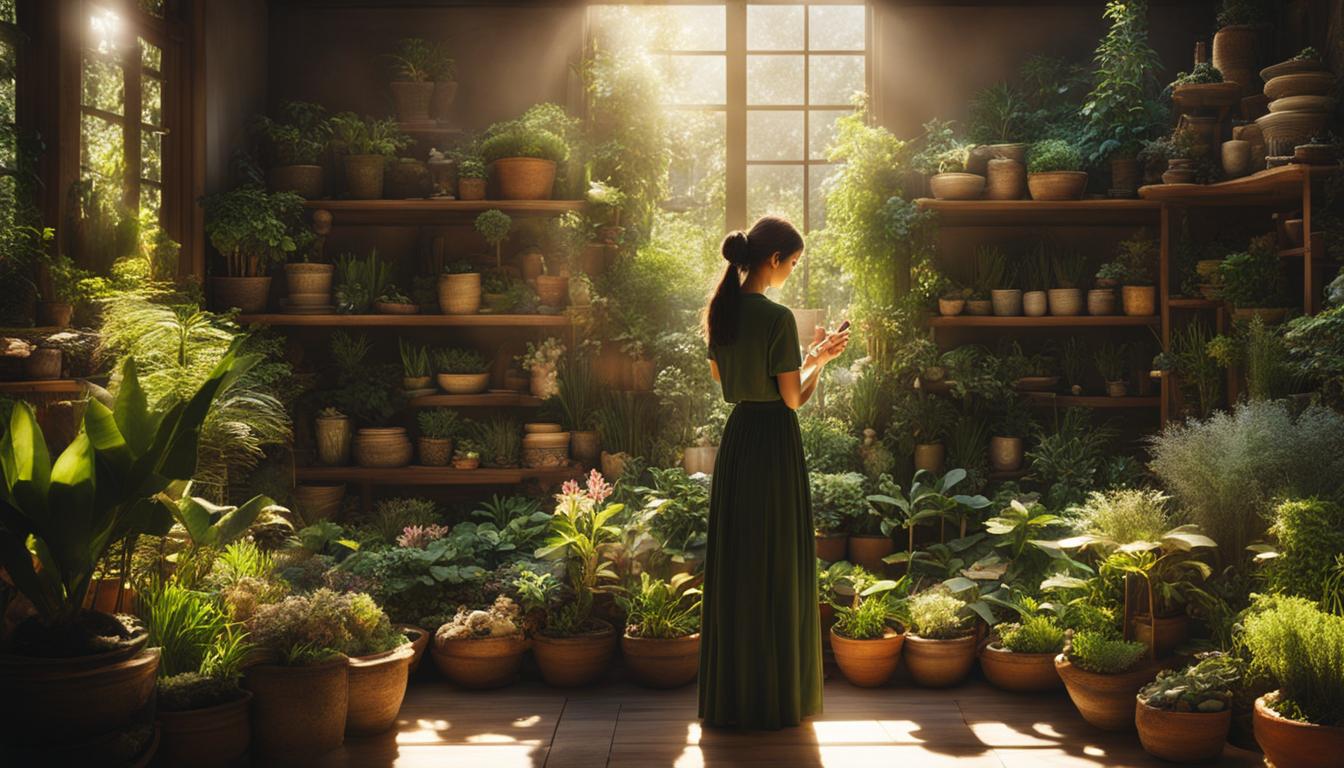Originally posted on October 28, 2023 @ 10:17 pm
Are you looking to bring a sense of peace and harmony to your outdoor space? Look no further than a feng shui garden. Planting a feng shui garden can help create balance and positive energy in your outdoor space, bringing you closer to nature and providing a peaceful oasis.
In this guide, we’ll teach you everything you need to know about planting a feng shui garden. From understanding feng shui principles to selecting the right plants and incorporating natural elements, we’ll provide you with the tools you need to create a harmonious outdoor space. So, let’s get started!
Key Takeaways:
- Planting a feng shui garden can create balance and positive energy in your outdoor space.
- Feng shui principles can be applied to the selection of plants, natural elements, and decorations in your garden.
- A feng shui garden can provide a peaceful oasis in your outdoor space, bringing you closer to nature.
- Proper care and maintenance are essential to maintaining balance and harmony in your feng shui garden.
- By following the principles of feng shui, you can enhance positive energy and abundance in your garden.
Understanding Feng Shui
Feng shui is an ancient Chinese practice that seeks to achieve harmony and balance between individuals and their environment. It is based on the idea that the arrangement of objects and spaces can affect the flow of energy (known as “Chi”) in a room, building, or garden, and can enhance or detract from well-being and prosperity.
Indoor plants can play an important role in feng shui, bringing natural energy and beauty to any space. They can help purify the air, improve mood, and reduce stress. However, not all plants are suitable for feng shui. Plants with sharp leaves, thorns, or cactus-like forms should be avoided, as they are believed to create negative energy.
Garden plants, on the other hand, are powerful feng shui tools that can attract positive energy and enhance the flow of Chi in an outdoor space. Careful selection of plants with specific shapes, colors, and symbolic meanings can help create a harmonious and balanced garden.
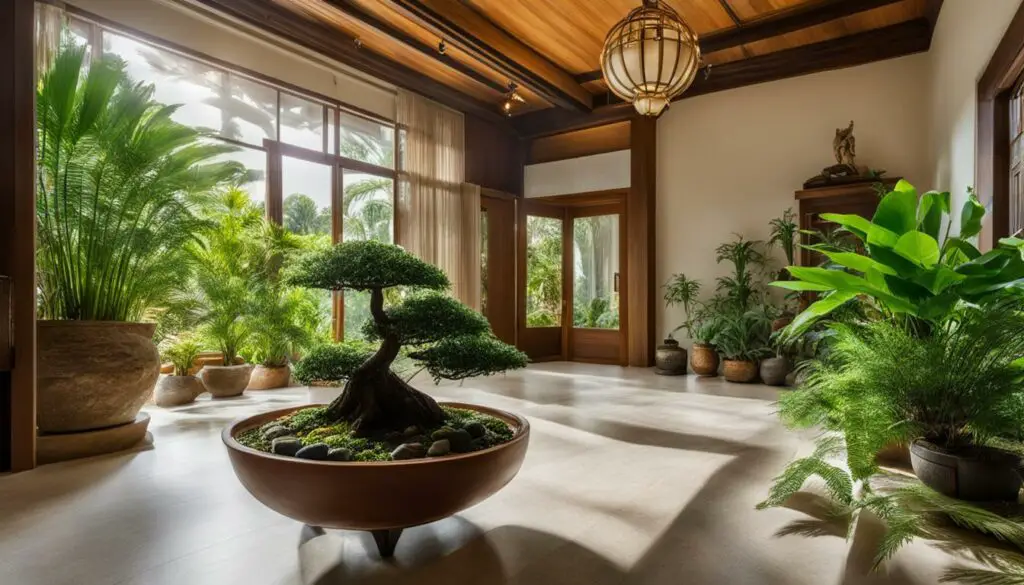
The Five Elements of Feng Shui
Feng shui is based on the concept of five elements: wood, fire, earth, metal, and water. These elements are believed to interact with each other and influence the Chi in a space, affecting the well-being of its inhabitants. Indoor and garden plants can be used to represent and balance these elements, depending on their shape, color, and location.
Feng Shui Indoor Plants
Indoor plants can be used to attract positive energy, purify the air, and promote health and well-being. The best feng shui plants for indoor spaces are those with round or flowing shapes, as they are believed to promote positive energy flow. These plants can include:
- Lucky Bamboo
- Rubber Plant
- Peace Lily
- Money Plant
Feng Shui Garden Plants
Garden plants can also be used to attract positive energy and promote balance and harmony in an outdoor space. The best feng shui plants for a garden are those that align with the five elements and the Bagua (a feng shui energy map). These plants can include:
| Element | Color | Plants |
|---|---|---|
| Wood | Green | Bamboo, Pine, Oak, Willow |
| Fire | Red, Orange, Purple, Pink, Yellow | Sunflowers, Roses, Peonies, Chrysanthemums |
| Earth | Earthy tones, Yellow, Brown | Marigolds, Daisies, Lavender, Sage, Thyme |
| Metal | White, Gray, Silver | Hostas, Dusty Miller, Lamb’s Ear |
| Water | Blue, Black | Water Lily, Iris, Bluebells, Elephant Ears |
By incorporating these plants into your indoor and outdoor spaces, you can create a balanced and harmonious environment that promotes health, well-being, and prosperity.
The Benefits of a Feng Shui Garden
If you are looking to bring positive energy and good luck into your home, then a feng shui garden is the perfect addition. By carefully selecting and arranging plants according to feng shui principles, you can create a harmonious and balanced outdoor space.
One of the main benefits of a feng shui garden is the ability to attract good luck and positive energy into your home. Certain plants, known as feng shui lucky plants, have been said to bring good fortune and prosperity. These include plants such as lucky bamboo, jade plants, and money trees.
Aside from attracting good luck, a feng shui garden can also create a peaceful and calming atmosphere. By incorporating feng shui plants for home, such as lavender or jasmine, you can promote relaxation and reduce stress levels.
In addition, a feng shui garden can also enhance the overall aesthetic of your outdoor space. By choosing plants with round or flowing shapes, such as peonies or cherry blossoms, you can create a visually appealing garden that aligns with feng shui principles.
Overall, a feng shui garden provides numerous benefits for both your physical and mental well-being, while also adding an attractive and harmonious element to your home’s exterior.
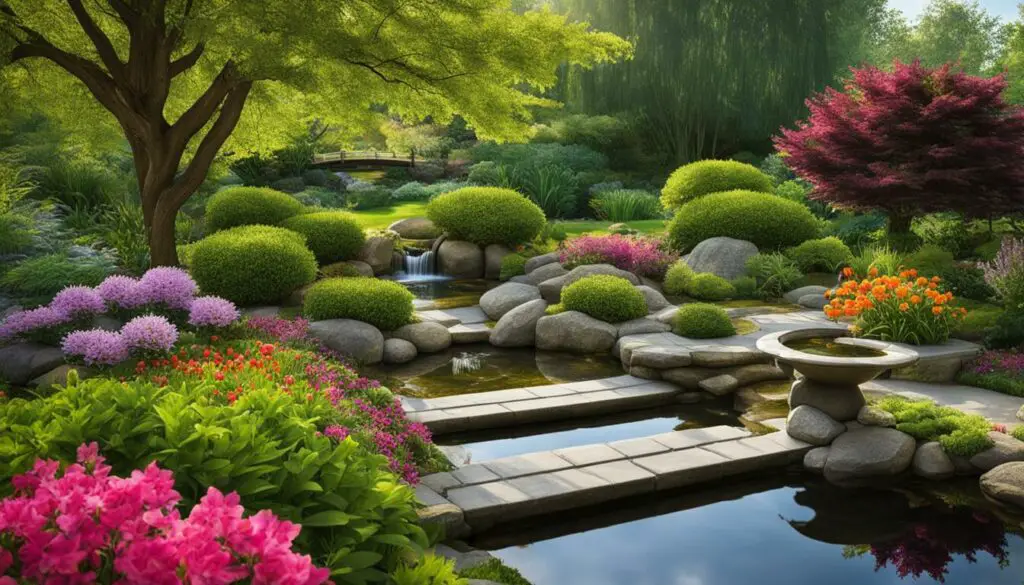
Choosing the Right Plants for Feng Shui
When it comes to selecting plants for your feng shui garden, it’s essential to choose ones that align with feng shui principles. Consider the following guidelines to choose the best plants for feng shui:
- Round or flowing shapes: Plants with round or flowing shapes are said to promote energy flow and create a sense of harmony. Consider plants such as ferns, succulents, and bamboo.
- Healthy and balanced: Plants that are healthy and balanced are believed to bring positive energy into your space. Make sure to choose plants that are well cared for and thriving.
- Symbolism: Certain plants have symbolic meanings in feng shui, such as the lucky bamboo plant, which is believed to attract prosperity and wealth.
- Placement: Consider the placement of your plants, such as placing tall plants towards the back and shorter plants towards the front.
Keep in mind that the best plants for feng shui will vary depending on the specific area of your garden and your personal preferences. It’s essential to choose plants that you find aesthetically pleasing and that align with your own energy.
Feng Shui Plants Table
| Plant | Symbolic Meaning | Placement |
|---|---|---|
| Lucky Bamboo | Attracts prosperity and wealth | Place in the wealth corner of your garden or home |
| Jade Plant | Symbolizes growth and renewal | Place in the southeast corner of your garden or home for abundance and wealth |
| Peace Lily | Promotes tranquility and peace | Place in the bedroom or other areas associated with relaxation |
| Sage | Clears negative energy and purifies the air | Place in areas of your garden or home that need cleansing, such as the entryway or living room |
Remember to select plants that align with your intentions and personal preferences while keeping feng shui principles in mind. By doing so, you can create a harmonious and balanced garden that brings positive energy and good luck into your life.
Feng Shui Plants for Specific Areas
When it comes to feng shui, different plants are believed to bring positive energy and luck to specific areas of your home or office. Here are some of the best feng shui plants for different areas:
Feng Shui Plants for the Office
Plants can help to promote productivity, creativity, and reduce stress in the workplace. Some of the best feng shui plants for the office include:
- Lucky Bamboo – symbolizes good fortune and prosperity
- Jade Plant – believed to attract wealth and success
- Snake Plant – known for its air purifying qualities
Feng Shui Plants for Wealth
For those looking to enhance their financial abundance, certain feng shui plants are believed to attract wealth and prosperity.
| Plant | Benefits |
|---|---|
| Money Tree | Attracts wealth and abundance |
| Chinese Evergreen | Brings good fortune and prosperity |
| Azalea | Enhances prosperity and abundance |
Feng Shui Plants for Positive Energy
Plants can help to purify the air and create a more positive energy flow in your home or office. Here are some of the best feng shui plants for promoting positive energy:
- Peace Lily – purifies the air and promotes tranquility
- Rubber Plant – believed to ward off negative energy
- Spider Plant – known to enhance positive energy flow
Be sure to place these plants in the appropriate areas of your space to maximize their positive effects.

Caring for Feng Shui Plants for Good Luck
Now that you have chosen the perfect feng shui plants for your garden, it’s essential to care for them properly. Feng shui plants are believed to bring good luck and positive energy, so it’s crucial to keep them healthy to ensure that they continue to thrive.
One crucial aspect of caring for feng shui plants is ensuring that they receive the correct amount of light and water. Different plants have varying requirements, so it’s essential to research the needs of each plant to ensure they receive the proper care.
Overwatering or underwatering can harm your feng shui plants and disrupt the flow of energy in your garden. It’s crucial to find the right balance and avoid watering them too much or too little.
You can enhance the good luck and positive energy of your feng shui plants by using organic fertilizers. These fertilizers are more natural and safer for the environment, and they will not disrupt the balance of energy in your garden. Additionally, avoid using pesticides and chemicals that can harm your plants and disrupt the positive energy in your garden.
Regularly prune your feng shui plants to remove any dead leaves or stems. This will stimulate new growth and ensure that your plants remain vibrant and healthy.
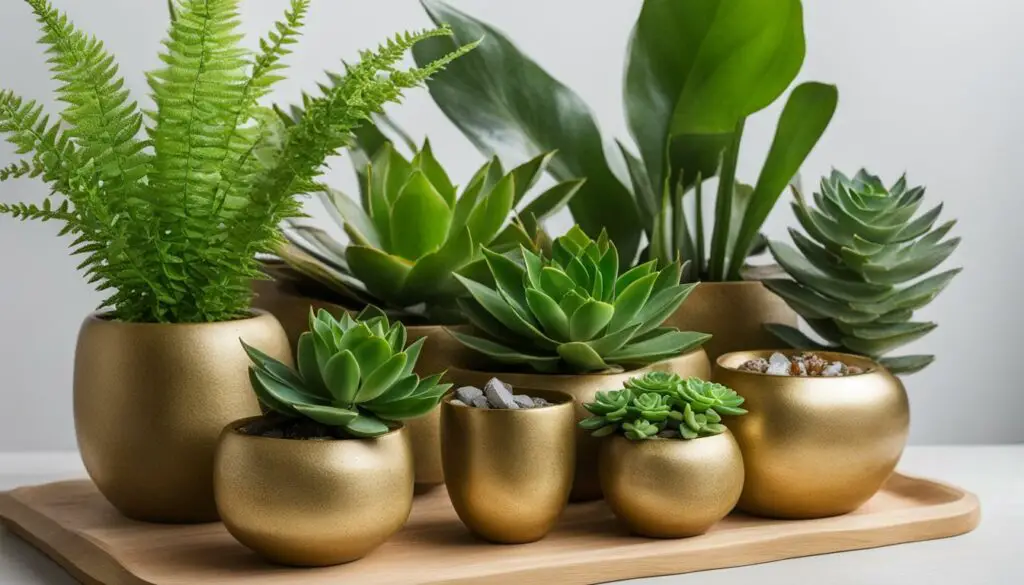
Remember, caring for your feng shui plants is not just about maintaining their physical health. It’s also essential to develop a meaningful relationship with them and treat them with care and respect. By doing so, you can enhance the positive energy in your garden and cultivate a harmonious and prosperous environment.
Placement and Arrangement of Plants
Proper placement and arrangement of plants in a feng shui garden is essential for creating a harmonious and balanced space. When designing your garden, consider the location, size, and shape of each plant, as well as how they relate to each other and the surrounding environment.
One important principle to keep in mind is the Bagua map, an essential tool in feng shui design. The Bagua map divides your space into nine areas, each corresponding to a different aspect of your life, such as wealth, health, and relationships. By placing plants in specific areas of your garden, you can enhance the energy flow and create a more harmonious environment.
Examples of Feng Shui Plant Placement:
| Location | Ideal Plants |
|---|---|
| North | Tall plants such as bamboo or pine trees to bring in positive energy and stability. |
| South | Plants with warm colors such as red or orange to enhance passion and creativity. |
| East | Plants with round or oval-shaped leaves to promote good health and family relationships. |
| West | Plants with white or metallic leaves to encourage a strong sense of self and clarity in decision-making. |
Another important aspect of feng shui plant placement is to avoid clutter and overcrowding. Overcrowding can disrupt the flow of energy, leading to stagnation and negative influences. Be sure to leave adequate space between plants and create pathways for easy navigation throughout the garden.
Finally, consider the overall balance and harmony of your garden. Use plants with varying shapes, sizes, and colors to create a visually appealing and energetically balanced space. You can also incorporate other elements such as rocks, crystals, and wind chimes to enhance the flow of energy and create a tranquil atmosphere.

Creating a Tranquil Water Feature
Incorporating a water feature in your feng shui garden can enhance the flow of energy and create a sense of tranquility. A water feature can also attract wealth and prosperity, making it a popular choice for those looking to enhance their garden’s feng shui.
When choosing a water feature, consider its size and placement in your garden. A large water feature can overpower a small garden and disrupt the flow of energy, while a small feature may not have enough of an impact on a larger garden.
It is also important to choose a water feature that complements the overall style and theme of your garden. A modern garden may benefit from a sleek, minimalist fountain, while a traditional garden may look better with a stone or ceramic water feature.
Placement and Arrangement of Water Features
The placement and arrangement of your water feature is critical to creating a harmonious and balanced garden. According to feng shui principles, the best location for a water feature is in the north, east, or southeast areas of your garden.
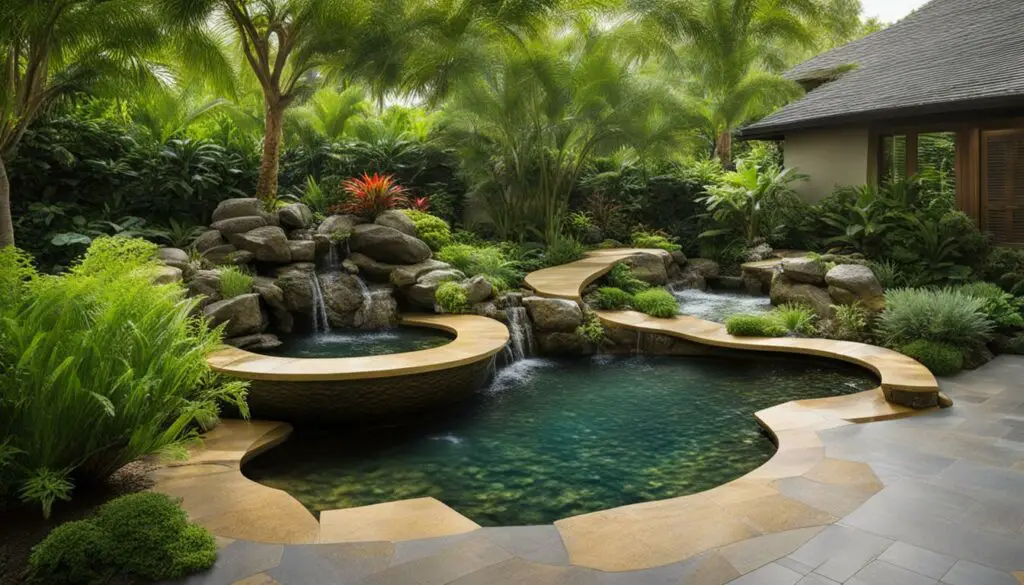
Placing a water feature in the north area of your garden can enhance your career and life path, while placing it in the east can attract good health and family relationships. Placing a water feature in the southeast area can attract wealth and abundance.
When arranging your water feature, ensure that it flows towards your home or living space, rather than away from it. This will invite positive energy into your home and create a sense of tranquility.
Caring for Your Water Feature
Proper maintenance is key to ensuring that your water feature remains a harmonious and positive aspect of your garden. Clean the water feature regularly to prevent the buildup of debris and algae, and ensure that the water is always flowing smoothly.
Incorporating a water feature into your feng shui garden can bring a sense of peace and tranquility to your living space. Remember to choose the right size and style, place it in the appropriate location, and maintain it properly to attract positive energy and enhance the flow of chi in your garden.
Incorporating Natural Elements
To enhance the energy flow in your feng shui garden, it’s essential to incorporate natural elements such as rocks, crystals, and wind chimes.
Rocks: Rocks are a staple in feng shui gardens. They symbolize stability and strength and can be used to create a sense of balance in your garden. Place large rocks in the northern or western section of your garden to attract supportive energy.
Crystals: Crystals are believed to have healing properties and can help to clear negative energy. Place crystal clusters in the southern or eastern section of your garden to attract abundance and growth.
Wind chimes: Wind chimes not only add a decorative touch but also create soothing sounds that enhance the flow of energy. Hang them in the southern or eastern section of your garden to attract positive energy.
Table:
| Natural Element | Placement | Meaning |
|---|---|---|
| Rocks | North or West | Stability and strength |
| Crystals | South or East | Healing and growth |
| Wind chimes | South or East | Soothing sounds and positive energy |
Integrating natural elements in your feng shui garden can create a peaceful and harmonious environment. Experiment with different combinations to find what works best for your space.
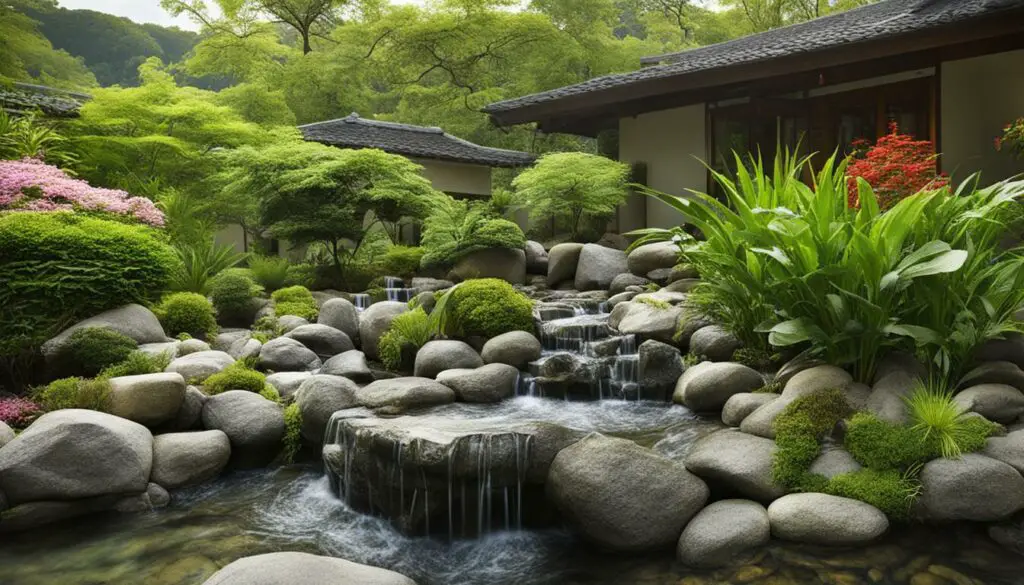
Balancing Yin and Yang
In feng shui, the concept of yin and yang represents the balance between two opposing forces. Yin is associated with passive, feminine energy, while yang is linked to active, masculine energy.
To create a harmonious feng shui garden, it’s essential to strike a balance between yin and yang. One way to achieve this is by incorporating both curved and straight lines, as well as round and angular shapes. For example, a round water feature surrounded by square pavers can create a perfect balance.
Color is another aspect that influences the balance of yin and yang in your garden. Warm colors, such as red and orange, are associated with yang energy, while cool colors, such as blue and green, are associated with yin energy.
Balancing Yin and Yang with Color
In feng shui, colors play a crucial role in creating a harmonious atmosphere. To balance yin and yang, it’s essential to choose colors that complement each other.
When selecting colors for your feng shui garden, consider using a color wheel to ensure a balanced mix of warm and cool colors. For example, you could choose a warm color, such as red, for a feature wall, and mix it with cool colors like blue and green for surrounding plants.
It’s important to note that too much of either yin or yang can upset the balance and create disharmony. Therefore, it’s crucial to find the right balance between the two energies to create a peaceful, harmonious feng shui garden.
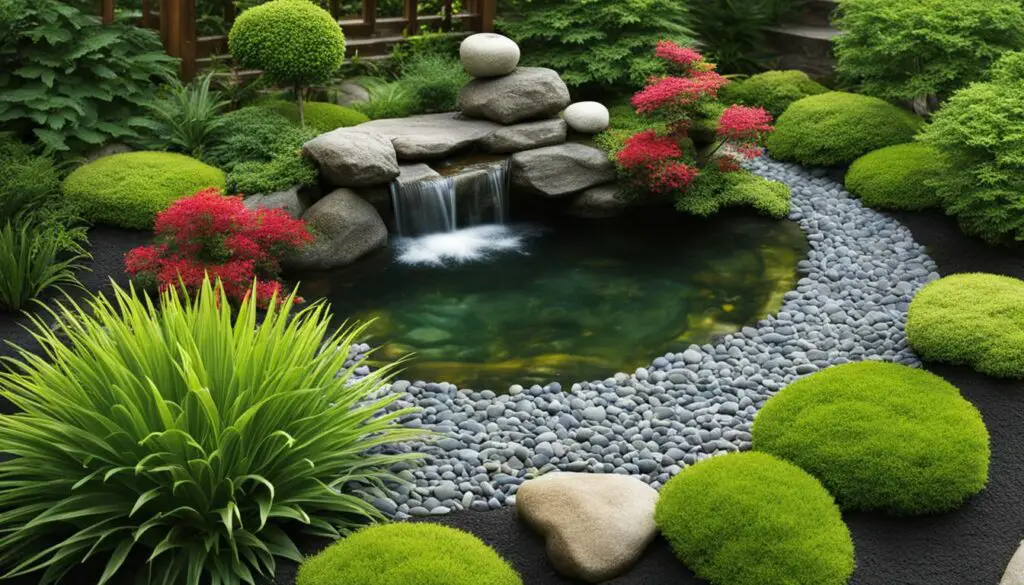
“The key to balance is aligning the yin and yang forces, creating a garden that reflects the principles of feng shui.”
Feng Shui Colors and Decorations
If you want to create a harmonious and balanced feng shui garden, it’s important to consider the colors and decorations you use. According to feng shui principles, different colors evoke different emotions and energies, so it’s essential to choose them carefully.
Colors
Some of the most popular feng shui colors for gardens include:
| Color | Symbolism |
|---|---|
| Green | Growth, harmony, healing |
| Red | Passion, energy, excitement |
| Yellow | Optimism, happiness, creativity |
| Blue | Calmness, relaxation, trust |
| Purple | Spirituality, luxury, mystery |
When using colors in your feng shui garden, it’s important to choose shades that complement each other and create a balanced overall look.
Decorations
In addition to using color, adding decorations to your feng shui garden can enhance its energy and aesthetics. Some popular feng shui decorations include:
- Wind chimes: These create a relaxing atmosphere and can help move stagnant energy.
- Crystals: Different types of crystals are believed to bring different energies, such as rose quartz for love and amethyst for clarity.
- Statues: These can represent different feng shui elements, such as water or wind, and bring balance to the garden.
When selecting decorations for your feng shui garden, consider the symbolism and energy they represent and how they fit into the overall design. Remember to keep the decorations balanced and avoid cluttering the space.
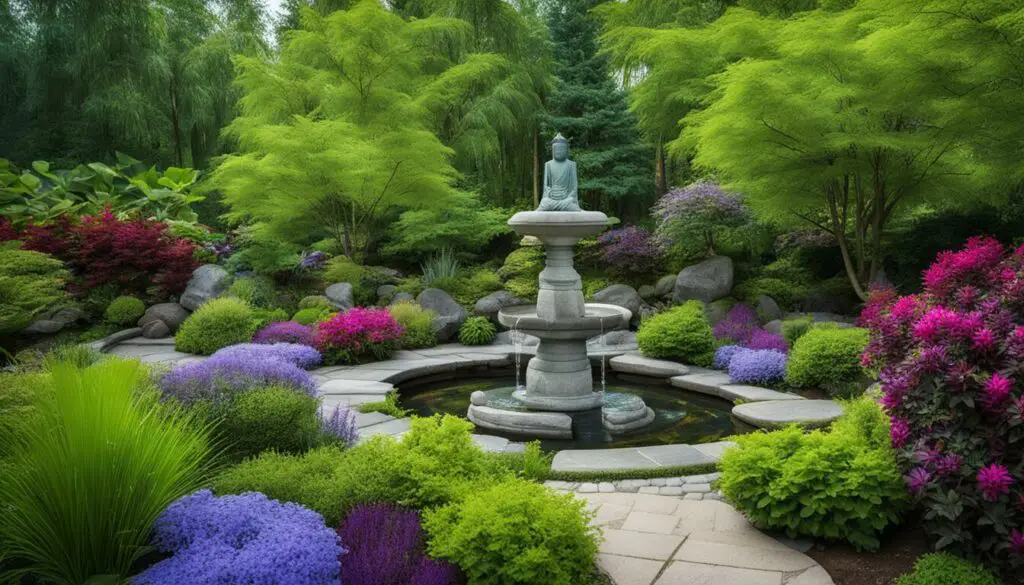
Enhancing Wealth and Abundance with Feng Shui
One of the core principles of feng shui is creating a harmonious space to attract positive energy, which includes wealth and abundance. Here are some tips to enhance wealth and abundance in your feng shui garden:
1. Choose Wealth-Attracting Plants
Select plants that are believed to attract wealth, such as the money tree, bamboo, and jade plant. These feng shui lucky plants are said to bring prosperity and good fortune to the space.
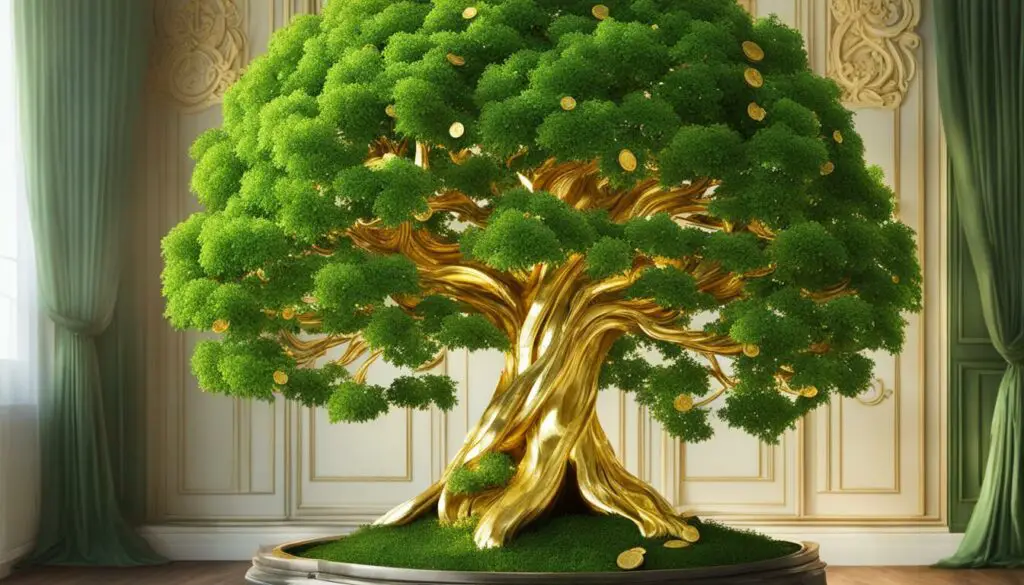
2. Incorporate Feng Shui Symbols
Using feng shui symbols, such as the wealth vase or the laughing Buddha, can help attract positive energy, wealth, and abundance to your garden. Place them in areas associated with wealth and prosperity, like the southeast corner of your garden.
3. Use Feng Shui Colors
Colors play an important role in feng shui, as they are believed to influence our thoughts and emotions. Incorporate colors like gold, purple, red, green, and blue into your garden to enhance wealth and abundance.
4. Create a Water Feature
Water is a powerful symbol of abundance and wealth in feng shui. Adding a water feature, such as a fountain or pond, can attract positive energy and prosperity to your garden. Place the water feature in the north, east, or southeast area of your garden.
5. Maintain Your Garden
To keep your garden thriving and abundant, make sure to maintain it regularly. Dead plants or clutter can block the flow of positive energy and hinder the abundance in your garden. Keep it clean, organized, and clutter-free to attract and maintain positive energy and abundance.
Creating a Peaceful Atmosphere
To invite positive energy, it’s essential to create a peaceful atmosphere in your feng shui garden. Start by clearing clutter and removing any objects that don’t align with feng shui principles. Consider incorporating a fountain or water feature, as the sound of flowing water can promote relaxation and a sense of calm. You can also add wind chimes to create a tranquil and soothing environment.
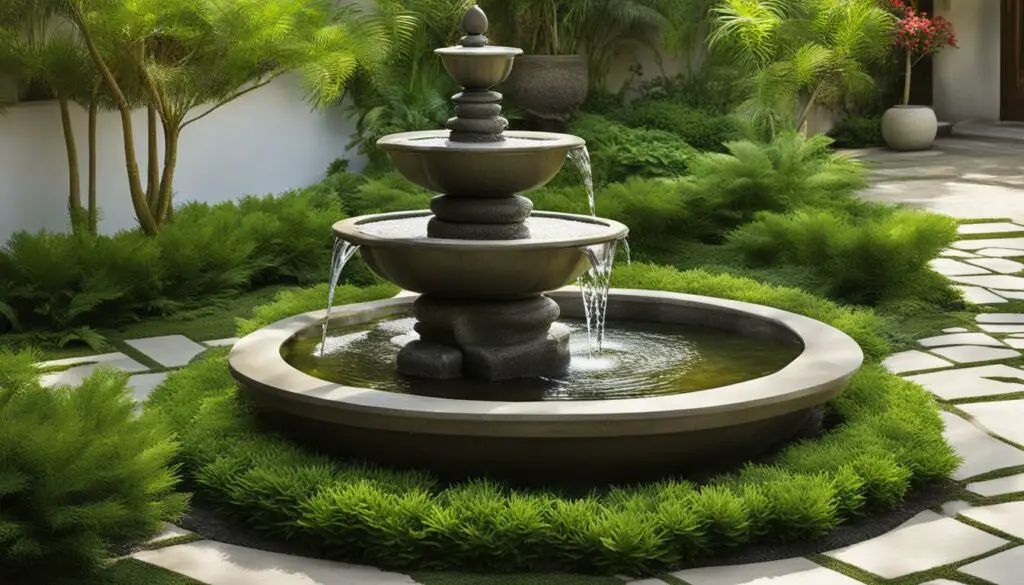
“A garden should make you feel you’ve entered privileged space — a place not just set apart but reverberant — and it seems to me that, to achieve this, the gardener must put some kind of twist on the existing landscape, turn its prose into something nearer poetry.” – Michael Pollan
Finally, add comfortable seating areas where you can sit and enjoy the peace and tranquility of your feng shui garden. Whether it’s a cozy bench or a set of lounge chairs, having a place to relax will encourage you to spend more time in your garden and reap the benefits of its positive energy.
Feng Shui Garden Design Ideas
Creating a feng shui garden is all about balancing the elements and energies in your outdoor space. There are many different design ideas to choose from, each with its own unique style and approach to feng shui principles.
Theme Gardens
One popular approach to feng shui garden design is to create a themed garden based on the five elements: wood, fire, earth, metal, and water. Each element has its own unique qualities and associations with different areas of life, such as career, love, and health.
For example, a wood-themed garden might feature plants with tall, vertical shapes, such as bamboo or pine trees, to represent growth and upward energy. A water-themed garden might include a flowing water feature, such as a fountain or pond, to represent fluidity and abundance.
Meditation Gardens
A meditation garden is designed to provide a peaceful and calming environment for meditation or relaxation. This type of garden typically includes elements such as a Zen garden, a water feature, and natural materials like rocks or gravel.
The layout of a meditation garden is often simple and symmetrical, with a central focal point and balanced planting arrangements. This type of garden can be a great way to cultivate a sense of mindfulness and inner peace in your outdoor space.
Container Gardens
If you have limited outdoor space or live in an urban area, a container garden can be a great way to incorporate feng shui principles into your surroundings. Container gardens can be created in a variety of shapes and sizes, and can feature a range of different plants depending on your needs and preferences.
When designing a feng shui container garden, it’s important to choose plants that are well-suited to the size and shape of your container. You can also incorporate other feng shui elements, such as rocks or crystals, to enhance the energy in your space.
Symbolic Gardens
A symbolic garden is designed to represent a specific idea or concept, such as balance, harmony, or prosperity. This type of garden might feature plants with specific associations, such as lucky bamboo or money trees, to enhance the energy in your space.
You can also incorporate other symbols or decorations into your garden to reinforce your chosen concept. For example, a garden designed to promote prosperity might include a statue or symbol of a money frog, which is believed to attract wealth and good fortune.
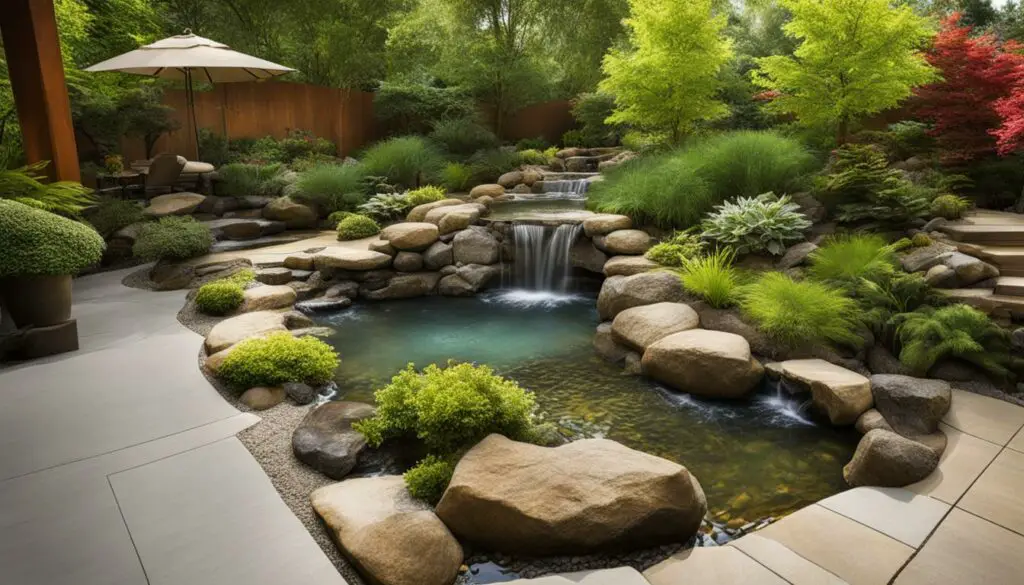
With so many different design ideas to choose from, creating a feng shui garden can be a fun and rewarding project. Whether you choose a themed garden, a meditation garden, a container garden, or a symbolic garden, the key is to create a balanced and harmonious outdoor space that reflects your personal style and promotes positive energy.
Maintaining Balance and Harmony
Creating a feng shui garden is not a one-time event; it is an ongoing process that requires attention and care. To maintain balance and harmony, you should regularly tend to your plants and make adjustments to the layout as needed. Here are some tips:
Regular Maintenance
Just like any other garden, a feng shui garden requires regular maintenance to stay healthy and vibrant. Make sure to water your plants regularly and prune them as needed. Remove any dead or damaged leaves and flowers to keep your plants looking their best.
Adjustment and Rebalancing
If you notice that the energy in your garden feels stagnant or off-balance, you may need to make some adjustments. You can rearrange the placement of your plants or add new elements to create a better flow of energy. Use crystals, stones, or wind chimes to enhance positive energy. Be open to experimenting and trying new things until you find the right balance.
Regular Cleaning and Clearing
To invite positive energy into your garden, you need to keep it clean and clutter-free. Remove any trash or debris, and clear away any dead leaves or plants. Regularly clean your water feature to prevent algae buildup. Take some time to meditate or practice yoga in your garden to clear your mind and invite peaceful energy.
Continued Learning
Finally, continue to learn and expand your knowledge of feng shui principles. Attend workshops or read books on feng shui gardening to gain new insights and ideas for your garden. Remember, a feng shui garden is an ongoing journey, and there is always more to discover.
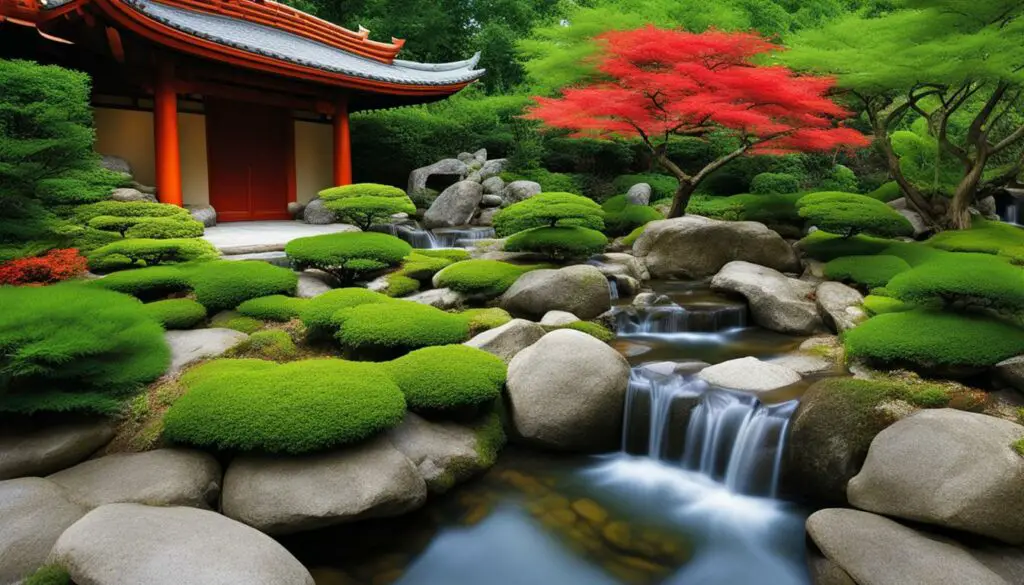
Conclusion
Congratulations on uncovering the secrets of planting a feng shui garden! By implementing the guidelines provided in this guide, you can create a harmonious and balanced environment that attracts positive energy and promotes well-being.
Remember to choose plants that align with feng shui principles, such as those with round or flowing shapes, and to incorporate natural elements and water features to enhance the flow of energy. Maintaining balance and harmony is key, so be sure to regularly care for your plants and adjust their placement as needed.
By inviting positive energy into your feng shui garden, you can create a peaceful and relaxing oasis that promotes abundance, good luck, and a sense of calm. So why wait? Start planting your feng shui garden today and enjoy the many benefits it has to offer!
FAQ
What is feng shui?
Feng shui is an ancient Chinese practice that focuses on creating a harmonious environment by arranging objects and spaces in a way that allows positive energy, or chi, to flow freely.
How does feng shui relate to plants?
Plants are an important element in feng shui as they represent growth, vitality, and the connection to nature. By incorporating specific plants, you can enhance the positive energy in your home or garden.
What are the benefits of having a feng shui garden?
A feng shui garden can bring numerous benefits, including attracting good luck, promoting positive energy, creating a peaceful and relaxing atmosphere, and enhancing the overall balance and harmony in your space.
How do I choose the right plants for feng shui?
When selecting plants for feng shui, look for ones that have round or flowing shapes, vibrant and healthy leaves, and positive associations. Some popular feng shui plants include the money tree, bamboo, and jade plant.
Are there specific feng shui plants for certain areas?
Yes, there are feng shui plants that are believed to enhance certain areas of your life. For example, placing a money tree in the wealth area of your home or office is said to attract abundance and prosperity.
How should I care for feng shui plants?
Caring for feng shui plants involves providing them with the right amount of water, sunlight, and nutrients. It’s also important to regularly prune and remove dead or dying leaves to maintain their vitality.
Is placement and arrangement of plants important in feng shui?
Yes, proper placement and arrangement of feng shui plants are key to creating a harmonious environment. Consider factors such as the Bagua, the energy map of your space, and the five feng shui elements when arranging your plants.
Should I incorporate a water feature in my feng shui garden?
Yes, a water feature such as a pond, fountain, or small water element can enhance the flow of energy in your feng shui garden. It symbolizes abundance and helps create a sense of tranquility.
How can I incorporate natural elements in my feng shui garden?
Rocks, crystals, wind chimes, and other natural elements can be strategically placed in your garden to enhance the energy flow and create a more harmonious space.
What does balancing Yin and Yang mean in feng shui?
Balancing Yin and Yang in feng shui means creating a harmonious blend of feminine and masculine energy in your garden. You can achieve this by incorporating both gentle, flowing plants (Yin) and strong, structured plants (Yang).
How can I use colors and decorations in my feng shui garden?
Colors and decorations in feng shui can be used to enhance the energy in your garden. Choose colors that correspond to the five feng shui elements and incorporate decorations that align with your desired intentions and themes.
Can feng shui principles enhance wealth and abundance in my garden?
Yes, feng shui principles can be applied to enhance wealth and abundance in your garden. By selecting specific plants, incorporating wealth symbols, and creating a balanced and inviting space, you can attract prosperity and abundance.
How can I invite positive energy into my feng shui garden?
To invite positive energy into your feng shui garden, it’s important to clear clutter, create a peaceful atmosphere, and maintain a well-organized and balanced space. You can also incorporate elements such as wind chimes or a Zen garden to enhance positive energy flow.
What are some feng shui garden design ideas?
There are endless possibilities for feng shui garden designs. You can create a Zen garden with simple, minimalist elements, or go for a lush and vibrant tropical garden. The key is to incorporate elements that align with feng shui principles and resonate with your personal style and preferences.
How can I maintain balance and harmony in my feng shui garden?
Maintain balance and harmony in your feng shui garden by regularly tending to your plants, adjusting the arrangement as needed, and keeping the space clean and free from clutter. Regular maintenance and attention will help ensure the positive energy in your garden continues to flow.
